NEWS
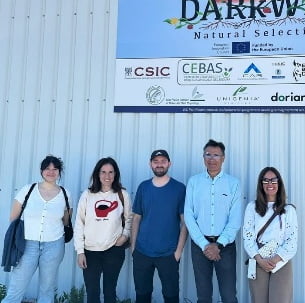
May 2025
UMUEmprende entrepreneurial doctoral proyect
PhD candidate Juan José Guerrero Franco from CEBAS-CSIC was selected in the UMU Emprende – CMN call for entrepreneurial doctoral projects by the University of Murcia with the innovative project DARkWIN. The aim was focused on exploring the potential of DARkWIN and providing valuable insights on how to bring research closer to market. It was a great step forward in connecting academic innovation with real-world impact.
UMUEmprende entrepreneurial doctoral proyect
PhD candidate Juan José Guerrero Franco from CEBAS-CSIC was selected in the UMU Emprende – CMN call for entrepreneurial doctoral projects by the University of Murcia with the innovative project DARkWIN. The aim was focused on exploring the potential of DARkWIN and providing valuable insights on how to bring research closer to market. It was a great step forward in connecting academic innovation with real-world impact.
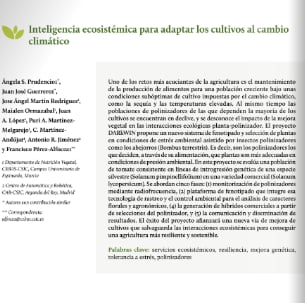
April 2025
New publication on ecosystem intelligence and crop resilience
We are pleased to share our latest publication, titled “Ecosystem intelligence to adapt crops to climate change”, now available in the Revista Española de Ciencias Agrarias (Vol. 3, 2025). In this article, we present the concept of ecosystem intelligence applied to plant phenotyping and selection, using bumblebees as natural sensors to identify stress-resilient tomato lines. See more here.
New publication on ecosystem intelligence and crop resilience
We are pleased to share our latest publication, titled “Ecosystem intelligence to adapt crops to climate change”, now available in the Revista Española de Ciencias Agrarias (Vol. 3, 2025). In this article, we present the concept of ecosystem intelligence applied to plant phenotyping and selection, using bumblebees as natural sensors to identify stress-resilient tomato lines. See more here.
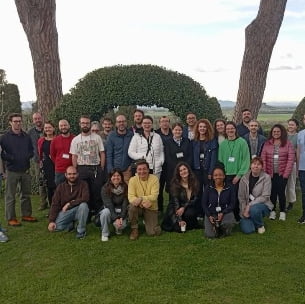
March 2025
Participation in SUSTAIN Training School
PhD candidate Juan José Guerrero Franco from CEBAS-CSIC participated in the third edition of the Training School of the SUSTAIN Action Cost on “Plant, Soil and Water Capability Assessment” held in Grosseto, Italy.
Participation in SUSTAIN Training School
PhD candidate Juan José Guerrero Franco from CEBAS-CSIC participated in the third edition of the Training School of the SUSTAIN Action Cost on “Plant, Soil and Water Capability Assessment” held in Grosseto, Italy.
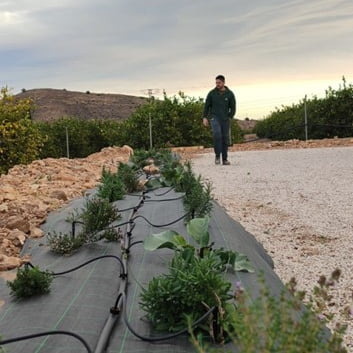
March 2025
New Conservation Plant Structure
Francisco Sandoval López, the DARkWIN agricultural technician, is already implementing a conservation plant structure on the DARkWIN phenotyping platform.
New Conservation Plant Structure
Francisco Sandoval López, the DARkWIN agricultural technician, is already implementing a conservation plant structure on the DARkWIN phenotyping platform.
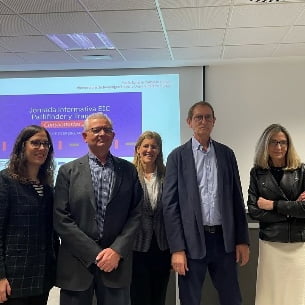
February 2025
EIC Pathfinder projects talk
Prof. Francisco Pérez Alfocea had the honor to have been invited to give a talk on the EIC Pathfinder projects dissemination session at University of Murcia.
EIC Pathfinder projects talk
Prof. Francisco Pérez Alfocea had the honor to have been invited to give a talk on the EIC Pathfinder projects dissemination session at University of Murcia.
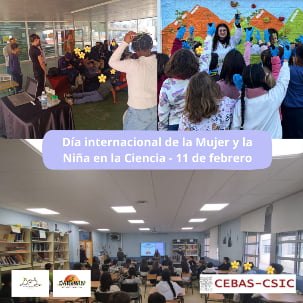
February 2025
Inspiring Young Minds Through Science!
Scientists from CEBAS-CSIC visited three different schools to celebrate the International Day of Women and Girls in Science and International Women’s Day. Through interactive games and workshops, they introduced students to the research conducted at the institute, fostering curiosity and enthusiasm for science among young learners.
Inspiring Young Minds Through Science!
Scientists from CEBAS-CSIC visited three different schools to celebrate the International Day of Women and Girls in Science and International Women’s Day. Through interactive games and workshops, they introduced students to the research conducted at the institute, fostering curiosity and enthusiasm for science among young learners.
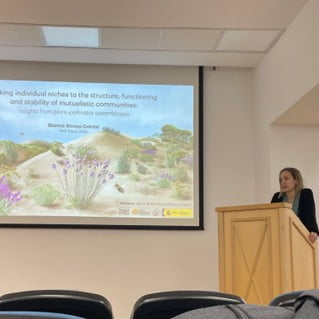
January 2025
New Thesis: Insights from plant-pollinator assemblages
lanca Arroyo defended her thesis entitled: Linking, individual niches to the structure, functioning and stability of mutualistic communities: Insights from plant-pollinator assemblages. Blanca Arroyo Correa is a researcher at the Doñana Biological Station (EBD-CSIC) Dr.Ignasi Bartomeus supervisor. She is very interested in understanding the ecological and evolutionary processes that generate and shape biodiversity. She participated in the Darkwin project, advising and analysing the flowers together with the PhD candidate Curro Molina last summer.
New Thesis: Insights from plant-pollinator assemblages
lanca Arroyo defended her thesis entitled: Linking, individual niches to the structure, functioning and stability of mutualistic communities: Insights from plant-pollinator assemblages. Blanca Arroyo Correa is a researcher at the Doñana Biological Station (EBD-CSIC) Dr.Ignasi Bartomeus supervisor. She is very interested in understanding the ecological and evolutionary processes that generate and shape biodiversity. She participated in the Darkwin project, advising and analysing the flowers together with the PhD candidate Curro Molina last summer.
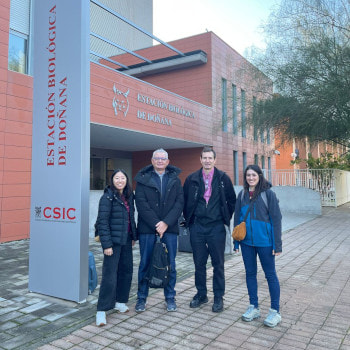
December 2024
Pollinator behaviour meeting
DARkWIN team has attended a meeting to discuss some aspects of pollinators. The researchers delved into the behaviour and preferences of bumblebees in their pollinator interaction and laid the groundwork for defining the next experimental campaign in 2025.
Pollinator behaviour meeting
DARkWIN team has attended a meeting to discuss some aspects of pollinators. The researchers delved into the behaviour and preferences of bumblebees in their pollinator interaction and laid the groundwork for defining the next experimental campaign in 2025.

November 2024
DARkWIN YouTube Channel
DARkWIN is now on YouTube! Explore our channel to watch the project’s promotional video, insightful talks from our workshop, and highlights from our participation at Fruit Attraction 2024.
Subscribe and stay updated!
DARkWIN YouTube Channel
DARkWIN is now on YouTube! Explore our channel to watch the project’s promotional video, insightful talks from our workshop, and highlights from our participation at Fruit Attraction 2024.
Subscribe and stay updated!
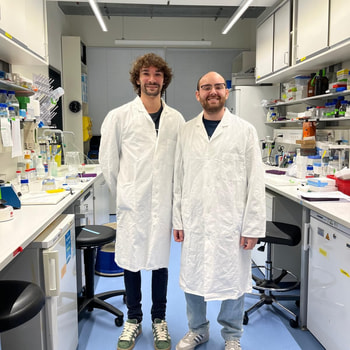
October 2024
DARkWIN Knowledge Exchange
We are thrilled to announce the collaboration between CEBAS-CSIC and MPIMP with the European Project DARkWIN. Our PhD student Juan José Guerrero spent 3 months carrying out volatilome studies of tomatoes with GC-MS under the supervisión of Dr. Guillaume Decros and Prof. Dr. Alisdair Fernie thanks to an fSÉNECA scholarship.
DARkWIN Knowledge Exchange
We are thrilled to announce the collaboration between CEBAS-CSIC and MPIMP with the European Project DARkWIN. Our PhD student Juan José Guerrero spent 3 months carrying out volatilome studies of tomatoes with GC-MS under the supervisión of Dr. Guillaume Decros and Prof. Dr. Alisdair Fernie thanks to an fSÉNECA scholarship.

September 2024
ADAPTING NATURE: THE REVOLUTIONARY JOURNEY OF FRANCISCO’S POLLINATOR-ASSISTED BREEDING PROJECT
The story behind the DARkWIN project is now available on the Deepsync.eu platform. This article tells how Prof. Dr. Francisco Pérez Alfocea came up with the idea of using pollinators and how he implemented it.
Read the whole article on Deepsync.eu!
By Caterina Falcinelli
ADAPTING NATURE: THE REVOLUTIONARY JOURNEY OF FRANCISCO’S POLLINATOR-ASSISTED BREEDING PROJECT
The story behind the DARkWIN project is now available on the Deepsync.eu platform. This article tells how Prof. Dr. Francisco Pérez Alfocea came up with the idea of using pollinators and how he implemented it.
Read the whole article on Deepsync.eu!
By Caterina Falcinelli
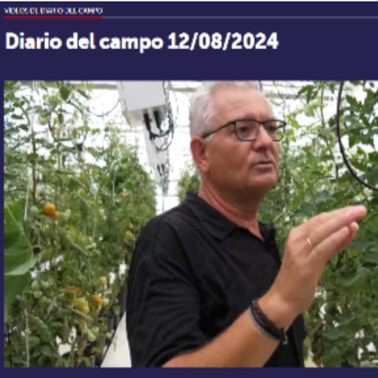
August 2024
DARkWIN featured on “Diario del Campo”
The coordinator of DARkWIN was featured on “Diario del Campo” (7RM), the regional TV channel of Murcia. In this intervies, they presented the Project platform and shared insights into its goals and impact on agricultura.
Watch it now to learn more about our innovative journey!
DARkWIN featured on “Diario del Campo”
The coordinator of DARkWIN was featured on “Diario del Campo” (7RM), the regional TV channel of Murcia. In this intervies, they presented the Project platform and shared insights into its goals and impact on agricultura.
Watch it now to learn more about our innovative journey!
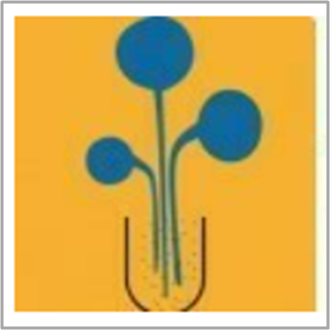
June 2024
DARkWIN PLATFORM: BUMBLEBEES USED TO SELECT PLANTS ADAPTED TO CLIMATE CHANGE
DARkWIN is a pollinator-assisted plant selection and phenotyping platform. Phenotyping and selection of floral traits is key to ensure food production by increasing plant resilience and animal pollination.
Read more here!
By Alicia Namesny (Tecnología Hortícola)
DARkWIN PLATFORM: BUMBLEBEES USED TO SELECT PLANTS ADAPTED TO CLIMATE CHANGE
DARkWIN is a pollinator-assisted plant selection and phenotyping platform. Phenotyping and selection of floral traits is key to ensure food production by increasing plant resilience and animal pollination.
Read more here!
By Alicia Namesny (Tecnología Hortícola)

May 2024
SCIENCE AND INNOVATION ADVANCE IN THE REGION ON THE BACK OF EUROPEAN FUNDS
Francisco Pérez-Alfocea and his research group are trying to identify which varieties of tomato plants will be better able to withstand climate change. To do this, they are subjecting these plants to water and heat stress conditions (low watering and high temperatures), and monitoring the interaction between these tomato plants and pollinating insects (bumblebees).
Read more here!
By Javier Pérez Parra (La Verdad)
SCIENCE AND INNOVATION ADVANCE IN THE REGION ON THE BACK OF EUROPEAN FUNDS
Francisco Pérez-Alfocea and his research group are trying to identify which varieties of tomato plants will be better able to withstand climate change. To do this, they are subjecting these plants to water and heat stress conditions (low watering and high temperatures), and monitoring the interaction between these tomato plants and pollinating insects (bumblebees).
Read more here!
By Javier Pérez Parra (La Verdad)
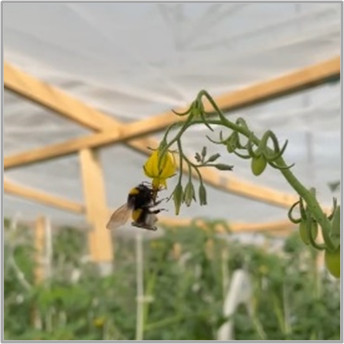
May 2024
DEEPSYNC.EU DARkWIN
Darkwin is already on Deepsync, a dynamic platform for increasing the impact of EIC Community projects, fostering collaboration, showcasing innovations and connecting stakeholders from across the deep tech ecosystem. Visit Deepsync.eu and learn the story behind the DARkWIN Project: “Tracking pollinator preferences in heat/drought-exposed tomato plants for resilience traits”.
DEEPSYNC.EU DARkWIN
Darkwin is already on Deepsync, a dynamic platform for increasing the impact of EIC Community projects, fostering collaboration, showcasing innovations and connecting stakeholders from across the deep tech ecosystem. Visit Deepsync.eu and learn the story behind the DARkWIN Project: “Tracking pollinator preferences in heat/drought-exposed tomato plants for resilience traits”.
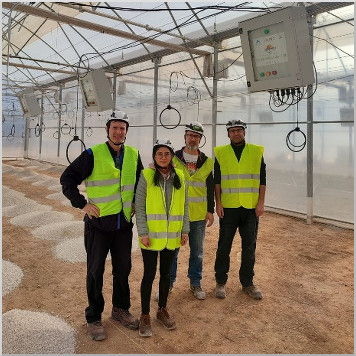
April 2024
RFID TECHNOLOGY TO TRACK BUMBLEBEES IS NOW READY
Within the framework of the DARkWIN Project, the deployment of the bumblebee RFID geo-localisation system developed by the LOPSI Group of the CAR-CSIC is now ready. We want to find out what are the pollination preferences of bumblebees on flowering tomato plants under climate change conditions.
RFID TECHNOLOGY TO TRACK BUMBLEBEES IS NOW READY
Within the framework of the DARkWIN Project, the deployment of the bumblebee RFID geo-localisation system developed by the LOPSI Group of the CAR-CSIC is now ready. We want to find out what are the pollination preferences of bumblebees on flowering tomato plants under climate change conditions.
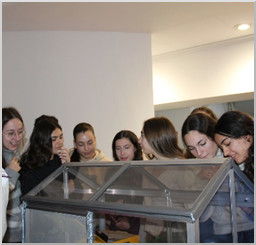
March 2024
CONNECTING YOUNG PEOPLE TO SCIENCE
As students, we all went through the uncertainty of not knowing what you want to do when you “grow up”. DARkWIN staff held a workshop in four different schools in Murcia (Spain) for students between 8 and 16 years of age. They were able to communicate the aim of the project, and showed the small greenhouse prototype. The youngsters had a lot of fun!
CONNECTING YOUNG PEOPLE TO SCIENCE
As students, we all went through the uncertainty of not knowing what you want to do when you “grow up”. DARkWIN staff held a workshop in four different schools in Murcia (Spain) for students between 8 and 16 years of age. They were able to communicate the aim of the project, and showed the small greenhouse prototype. The youngsters had a lot of fun!
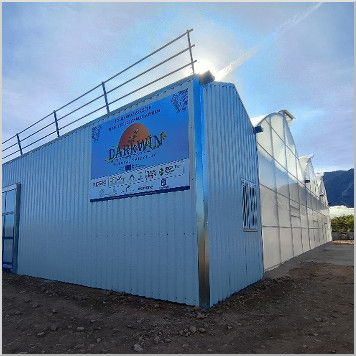
March 2024
WE HAVE A NEW HOME!
In 2024 a greenhouse with more than 1,000 ha of land was built on the Santomera experimental field in Murcia (Spain). As designed in WP2, six different modules have been created to host more than 1200 plants for the proposed trial. This task was carried out by the company NOVAGRIC.
WE HAVE A NEW HOME!
In 2024 a greenhouse with more than 1,000 ha of land was built on the Santomera experimental field in Murcia (Spain). As designed in WP2, six different modules have been created to host more than 1200 plants for the proposed trial. This task was carried out by the company NOVAGRIC.
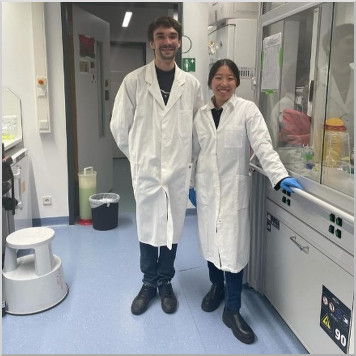
September 2023
KNOWLEDGE TRANSFER BETWEEN PARTNERS: SPAIN AND GERMANY
We are very grateful for the collaboration between Centro de Edafología y Biología Aplicada del Segura (CEBAS-CSIC) and Max Planck Institute of Molecular Plant Physiology with the European Project DARkWIN. Our PhD student Maialen Ormazabal Oria spent 3 months carrying out metabolomic studies of tomatoes with GC-MS, under the supervision of Dr. Guillaume Decros, in the group of Prof. Dr. Alisdair Fernie thanks to an iMOVE2023 scholarship.
KNOWLEDGE TRANSFER BETWEEN PARTNERS: SPAIN AND GERMANY
We are very grateful for the collaboration between Centro de Edafología y Biología Aplicada del Segura (CEBAS-CSIC) and Max Planck Institute of Molecular Plant Physiology with the European Project DARkWIN. Our PhD student Maialen Ormazabal Oria spent 3 months carrying out metabolomic studies of tomatoes with GC-MS, under the supervision of Dr. Guillaume Decros, in the group of Prof. Dr. Alisdair Fernie thanks to an iMOVE2023 scholarship.

April 2024
HOW BUMBLEBEES SUPPORT SUSTAINABLE AGRICULTURE?
Did you know Bumblebees detect the chemical signature of stress tolerant plants? What a windfall for sustainable agriculture: Pollinators can help select varieties adapted to low input farming, and create crops that produce more with less! They join their forces to identify crops with good stress tolerance… and potentially to develop new varieties of tomatoes for sustainable farming!
Read more here!
By Romain Royer (Doriane)
HOW BUMBLEBEES SUPPORT SUSTAINABLE AGRICULTURE?
Did you know Bumblebees detect the chemical signature of stress tolerant plants? What a windfall for sustainable agriculture: Pollinators can help select varieties adapted to low input farming, and create crops that produce more with less! They join their forces to identify crops with good stress tolerance… and potentially to develop new varieties of tomatoes for sustainable farming!
Read more here!
By Romain Royer (Doriane)

March 2023
A PROJECT WILL TRACK POLLINATOR PREFERENCES TO SELECT MORE RESISTANT PLANTS
DARkWIN will track the preferences of bumblebees (which will be followed by radio frequency) to guide natural selection and plant breeding. They will do this in an experimental crop, exposed to heat and drought, and using Living IoT technology.
Read more here!
By R+D CSIC
A PROJECT WILL TRACK POLLINATOR PREFERENCES TO SELECT MORE RESISTANT PLANTS
DARkWIN will track the preferences of bumblebees (which will be followed by radio frequency) to guide natural selection and plant breeding. They will do this in an experimental crop, exposed to heat and drought, and using Living IoT technology.
Read more here!
By R+D CSIC

March 2023
LAUNCHES A PROJECT TO IMPROVE CROPS IN THE FACE OF CLIMATE CHANGE
The innovation lies in the formula chosen to achieve their objective, as researchers at CEBAS are trying to get the bumblebees to choose the crop varieties most likely to be successful.
Read more here!
By Paco Martínez (Onda Regional de Murcia)
LAUNCHES A PROJECT TO IMPROVE CROPS IN THE FACE OF CLIMATE CHANGE
The innovation lies in the formula chosen to achieve their objective, as researchers at CEBAS are trying to get the bumblebees to choose the crop varieties most likely to be successful.
Read more here!
By Paco Martínez (Onda Regional de Murcia)

February 2023
CEBAS-CSIC LEADS A EUROPEAN PROJECT FOR CROP IMPROVEMENT IN THE FACE OF CLIMATE CHANGE, BASED ON THE NATURAL SELECTION OF PLANTS THROUGH POLLINATING INSECTS
Read more here!
By Cartagena Actualidad
CEBAS-CSIC LEADS A EUROPEAN PROJECT FOR CROP IMPROVEMENT IN THE FACE OF CLIMATE CHANGE, BASED ON THE NATURAL SELECTION OF PLANTS THROUGH POLLINATING INSECTS
Read more here!
By Cartagena Actualidad

February 2023
CEBAS-CSIC LEADS A PROJECT TO IMPROVE CROPS IN THE FACE OF CLIMATE CHANGE BASED ON THE NATURAL SELECTION OF PLANTS
The Centro de Edafología y Biología Aplicada del Segura (CEBAS-CSIC) is leading a European project to improve crops in the face of climate change based on the natural selection of plants through pollinating insects.
Read more here!
By Europa Press
CEBAS-CSIC LEADS A PROJECT TO IMPROVE CROPS IN THE FACE OF CLIMATE CHANGE BASED ON THE NATURAL SELECTION OF PLANTS
The Centro de Edafología y Biología Aplicada del Segura (CEBAS-CSIC) is leading a European project to improve crops in the face of climate change based on the natural selection of plants through pollinating insects.
Read more here!
By Europa Press

February 2023
A ‘MURCIAN’ PROJECT SEEKS TO IMPROVE CROPS IN THE FACE OF CLIMATE CHANGE WITH NATURAL PLANT SELECTION
The project, called 'DARkWIN', combines electronic and robotic techniques, greenhouse technologies, crop physiology, agroecology, entomology, metabolomics, transcriptomics, bioinformatics and genetics.
Read more here!
By Murcia Plaza
A ‘MURCIAN’ PROJECT SEEKS TO IMPROVE CROPS IN THE FACE OF CLIMATE CHANGE WITH NATURAL PLANT SELECTION
The project, called 'DARkWIN', combines electronic and robotic techniques, greenhouse technologies, crop physiology, agroecology, entomology, metabolomics, transcriptomics, bioinformatics and genetics.
Read more here!
By Murcia Plaza